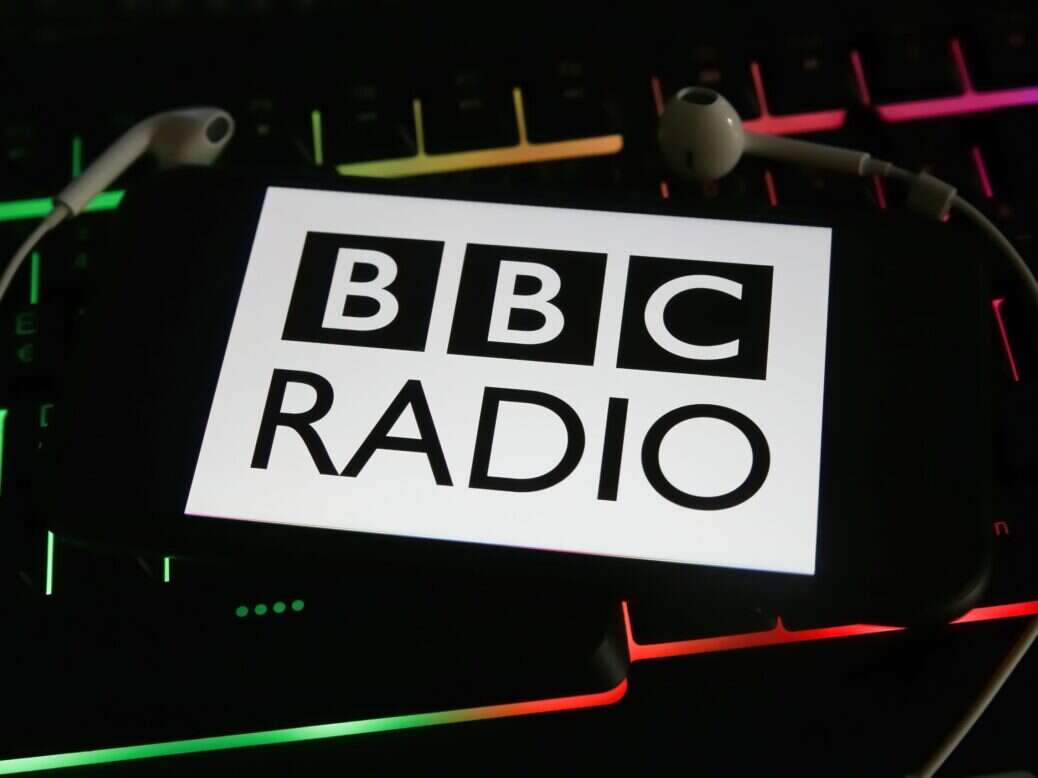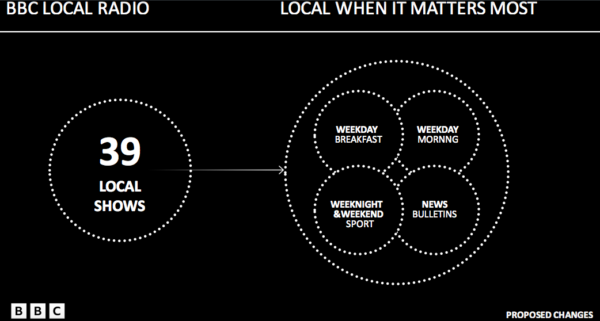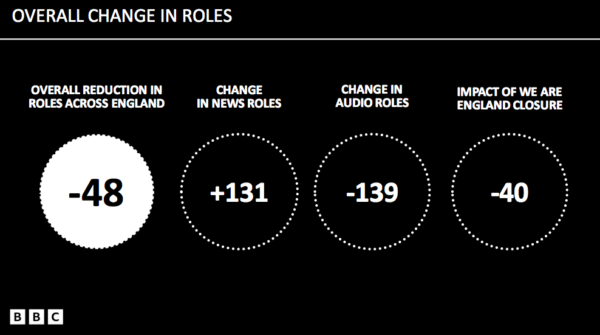
Last week, the BBC announced plans to cut 139 staff roles at its local radio stations around England.
In the proposal, through which the BBC is repurposing £19m from radio budgets into online and multimedia, many more programmes will be shared between local stations.
For example, between 6pm to 10pm on weekdays, Saturday daytime and Sunday mornings there will be ten regional programmes, while a new “all-England” show will air between 10pm and 1am on weekdays and on Sunday afternoons and evenings.
As well as all local presenting roles being put at risk of redundancy, station manager/executive editor roles for most stations will be shared, reducing the number to 22 for 40 outlets.
At the same time the BBC is losing a further 40 jobs with the closure of investigative TV strand We Are England but creating 131 jobs in local online news, meaning a net loss of 48.
Here a BBC local radio producer and journalist writes anonymously for Press Gazette about the mood behind the scenes since staff were told of the plans.
Tuning into the BBC’s England-wide ‘Local Value For All’ briefing call on Monday afternoon was one of those haunting experiences you’ll never forget.
Seeing some colleagues teary eyed, others in deathly silence, and many with red faces of fury and thunder, it would soon become an event where those present would remember exactly where they were.
No matter whether you were watching on a big screen with colleagues in a newsroom in Oxford, remotely on your own, or in the background while continuing to do your job – as I was – it was a shelling from on high.
I was producing the on-air output that day for one of the 40 BBC local radio stations in England (and the Channel Islands) which will be heavily affected, and the mood was already sombre. Many were quite verbal on fearing the worst.
Over the previous days, several colleagues, including a presenter I work with who has been at the station for decades, reminded me of the meeting and ominously said: “We’ll find out if we still have jobs, or what the future will be.” His will no longer be engaging with thousands of listeners who regard him as part of their living room furniture.
But between the changes brought in since the Covid pandemic, the initial meetings staff had in May and June, and the leaks that led to an article on The Guardian’s website the day before the announcement, I’d be lying if I said it didn’t come as a complete surprise.
So, before I rant about the feelings expressed by my colleagues allow me explain the changes in layman terms, as I know even for experienced journalists the BBC can seem like a ball of confusion and jargon.
The reasons behind the proposals, and reality
“Attracting a new younger audience by transforming the way we work and adopting a ‘digital first’ approach in everything that we do” are the words of Rhodri Talfan Davies, who as the director of BBC Nations is one of the key architects of these proposals.
The other is Jason Horton, acting director of BBC Local. He’s been in post for barely four months, is very much Rhodri’s No.2 and has said very little on the reasoning behind the proposals. In general he admitted that “local radio is superb” but that they “needed to do a balancing act”.

Quite simply, a shrinking by the Government of the TV licence fee in real terms, and the pressure – rightly or wrongly – to attract a younger audience with a new model similar to completely different media organisations, has led to these plans.
Looking deeper into the issue, what’s quite clear is there are significant problems at the BBC – but that problem is found at the top of the organisation not, as they would let you believe, in its output on the ground.
The BBC has taken a battering from the Conservative governments of the last 12 years, who have continually cut its funding, tampered unreasonably with the Royal Charter, used the corporation for political point scoring and media bashing while threatening to end its current funding structure all together.
This was magnified under the recent tenure of Nadine Dorries as Culture Secretary, and if you’ve seen the cringeworthy parliamentary committee where she admits to sharing a Netflix account while stating that the BBC’s funding model is outdated and it “needs to be more like Netflix”, you quickly realize the extent of the problem.
There’s no question that the BBC needs to be more agile with its shrinking funding but the likes of Talfan Davies and director-general Tim Davie have bowed to the critics and agree with them – or they’re running in fear of them – all of which is deeply concerning.
Staff at the radio station I work for have been suspicious of senior figures in the corporation for a long time. Davie – and his predecessor Lord Tony Hall – are widely seen to have done a really poor job in defending and highlighting the good work and positives of the BBC.
Many moan about the TV licence fee but most people don’t realise that the BBC has spent £300m from the fee under the current charter alone on the rollout of superfast full fibre broadband – at the Government’s insistence.
That money dwarfs the £19m remodeling by Talfan Davies, and if the BBC hadn’t have done that, the average person wouldn’t be able to watch and enjoy subscription services like Netflix.
Several colleagues of mine have mentioned to me the biggest issue with the TV licence fee is the name: if it was simply called a TV and broadband (or multi-media) licence, most critics would be silenced.
The BBC’s investment for the public’s benefit should be shouted about, as should the fact that for every £1 of licence fee activity, £2.63 is generated in the economy.
One way the BBC should save money is instead by ending eye-watering salaries for executives. Last September half of the BBC’s top executive team were given pay rises of up to 40% with Davie being paid over £525,000 and Talfan Davies on £260,000.
Meanwhile many of my frontline first-class colleagues are paid barely £25,000 a year.
Stressed and depressed – What’s going on behind the scenes
Stressed radio presenters feeling stretched due to the introduction of four-hour shows, and depressed producers working overtime to try and fill the gaps left by shrinking staff numbers – that’s the reality of life at a BBC local radio station.
The media industry, through the demise of commercial radio under Ofcom and the advent of free news online with changing habits, has been struggling for years.
That disease is now fully extending to public broadcasting as well, and it has already changed the culture and made most offices not very nice places to work. Long gone are the days where you feel valued and not exhausted.
One presenter said to me matter-of-factly after Monday’s meetings: “Well I’m out of a job, that’s my third redundancy in five years.” He lost his job in commercial radio before joining the Beeb.
What will happen to some of these skilled and popular people makes me shudder. Some have expressed hope to me that there will be an uproar from staff, audiences, unions and key public figures strong enough to make executives change their mind, but this has been planned for a while so I, like many, am left with no hope and fearing even tougher times ahead.

The NUJ have called it “a sh**ty week for everyone working in BBC England” and the “biggest ever threat” to BBC Local Radio” while a colleague asked management “why are you ripping the heart out of local radio?”
I’ve been in two union chapel meetings this week, and two further briefings from management, and some of the feelings expressed and questions asked to executives include “Why have you given up on local radio?”, “Why are you cutting even more money from England after 2020 cuts?” and “Why is TV and online taking over?”
This sentiment has been matched by audiences up and down the country. On Tuesday, BBC Three Counties Radio’s JVS show asked the public how they felt about the significant cuts.
Among the callers in was Martin Tett, the Tory leader of Buckinghamshire Council. Speaking to Jonathan Vernon-Smith, he said: “I’m pretty gutted. I’ve lost count of the number of times I’ve been grilled by Roberto [Perrone] in the evenings about a whole host of different topics.
“I’ve been hauled over the coals about things I’ve said and done, it’s a great way of just getting messages out and being held to account. It’s going to be a tremendous loss.”
We’ve already had mass voluntary redundancies two years ago, a stripping back of local shows during Covid, closures of local offices and local opt-out services, and a national centralising of who decides the music played out – all of which have proved incredibly unpopular.
Recently during the period of mourning from the late Queen’s death, the BBC reverted to all-England output, leading to numerous complaints, yet that will now become a weekly norm on evenings and weekends.
There appears to be a real mess in how different broadcasting areas will be joined up: Talfan Davies stated to staff in an all-England follow-up call on Friday morning that “there doesn’t seem to be any dilution of the quality of the service provided locally when shows straddle more than one boundary”.
Yet some in key broadcasting times, such as drivetime, shows will straddle as many as six county boundaries in the East of England region.
Meanwhile Cumbria will be paired with Lancashire on weekday afternoons, yet go with Newcastle and Tees on weekend mid-morning/daytime shows. The feeling among colleagues is that these plans show a real disconnect between management and what local radio does well, while destroying stations’ connection to their audience.
Local radio gets its best listenership levels in rural areas, yet that’s where the biggest hit is being taken. Meanwhile Manchester and London, stations less successful in the percentage of their potential audience that listen to local radio, are less affected.
The staffing figures also don’t include freelances who will be cut: at one local radio station I work for, at least ten people will lose their shifts, and these are people who are relied upon to produce afternoon, evening and weekend shows. It seems shrewd now that management have increasingly not brought these people onto the staff, helping to keep the figures down.
What is clear from the meetings this week is that opposition is mounting. This BBC journalist hopes this continues, as it will be damaging not just to me and my colleagues but to wider society if these cuts go through as they stand.
BBC response
In response to the points about staff, BBC spokesperson said: “Our proposals clearly set out the need for a number of new and different roles. Adapting our services requires a completely different way of working. We are conducting this process fairly and in consultation with staff, doing our very best to avoid compulsory redundancies.”
Rhodri Talfan Davies, BBC Director of Nations, said: “These proposals aim to maintain the distinctiveness of our local services while allowing the BBC to adapt with our audiences and ensure we remain relevant.
“Taken together they will ensure our network of local services – across tv, radio, online and Sounds – offer more value for audiences. Of course, change is never easy – and we will work closely with all our colleagues to introduce these plans sensitively and fairly.
“BBC Local Radio remains an essential service for millions of listeners – the very best local radio network in the world – but it’s also essential we make difficult choices that will enable us to reach out to many people that increasingly rely on their mobiles for local content.”
Picture: Shutterstock
Email pged@pressgazette.co.uk to point out mistakes, provide story tips or send in a letter for publication on our "Letters Page" blog
